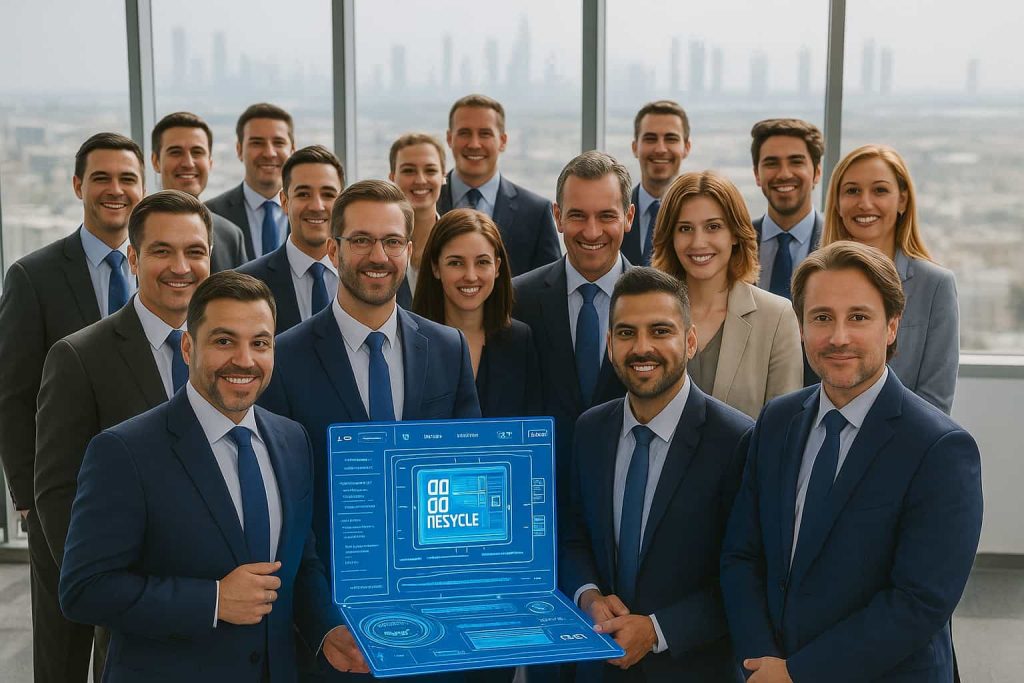Market Analysis and Opportunities
The United Arab Emirates, with Dubai as its business epicenter, is rapidly transforming into a global technology and knowledge hub. In this context, the demand for advanced software skills is surging. Launching an Online software skills training platform in Dubai is aligned with both the UAE Vision 2030 and the emirate’s goal to become a leader in digital innovation and smart city infrastructure.
Target Market Analysis
The market for online education and software skills development in the UAE is substantial and growing. According to the UAE Ministry of Education, digital learning investments and the broader EdTech sector are expected to rise at a CAGR of over 13% from 2022 to 2027. Dubai, as a magnet for multinational corporations and tech-driven startups, attracts a diverse population of professionals seeking upskilling opportunities.
- Customer Segments: University graduates, employed professionals, entrepreneurs, and corporations seeking B2B training for employees.
- Consumer Preferences: There is a strong preference for flexible, self-paced, and certified online learning programs. English and Arabic content are equally important for mass-market reach in Dubai’s multicultural society.
- Key Trends: Digital transformation, AI integration, and cloud-based collaboration tools are shaping the industry. There is burgeoning demand for skills in coding, cybersecurity, data analytics, project management, and UI/UX design.
Marketing Needs
For a new entrant, effective marketing is essential to gain visibility and build trust:
- Comprehensive market research to identify audience pain points and benchmark leading competitors.
- Targeted digital campaigns using SEO, PPC, and localized social media advertising to attract Emirati and expatriate learners.
- Branding strategies to position the platform as a premium, career-changing solution.
Tailored content marketing, such as launching a specialized blog on emerging software skills, will further establish domain authority. Collaborations with business partners and government talent initiatives can amplify reach.
Expansion Potential
The platform has natural scalability:
- Expansion into GCC countries, leveraging Dubai’s logistics and market connectivity.
- Diversification into B2B segments, offering bulk licensing and corporate training solutions.
- Export potential to South Asia and Africa via English-language programs, using Dubai as a regional hub.
Comprehensive Business Overview
An Online software skills training platform operates within the EdTech industry, offering interactive and accredited courses on key software topics. Core offerings include video courses, live classes, coding bootcamps, certification modules, and corporate training packages.
- Business Model: Subscription-based access, pay-per-course, and B2B SaaS packages for corporations.
- Target Audience: Individuals (students, jobseekers, professionals), and enterprises seeking workforce upskilling.
- Operational Scope: Courses delivered online with localized language and cultural customization.
Mission: To empower Dubai’s and the UAE’s diverse workforce with modern software skills, supporting national digital transformation goals.
Vision: To be the leading platform for software skills training in the Middle East, fostering lifelong learning and technology-driven growth.
Core Objectives:
- Provide industry-standard curricula aligned with employer needs.
- Offer flexible, affordable, and accessible learning solutions.
- Support Dubai’s drive to become a smart, skill-rich city.
Most suitable for a startup or early growth-stage business, the platform should ideally be located in a Dubai Free Zone such as Dubai Internet City or Dubai Knowledge Park. Both offer business-friendly environments, modern infrastructure, and simplified licensing processes.
Competitive Advantage
Launching a software skills training platform in Dubai presents competitive advantages for different stakeholders:
Entrepreneur Perspective
- Lack of saturation in high-quality, Arabic/English bilingual EdTech platforms targeting professional upskilling.
- Access to world-class infrastructure, tax incentives, and strong governmental support for tech businesses in Dubai.
- Dubai’s strategic location and multicultural workforce facilitate rapid user acquisition and ecosystem connections.
Investor Perspective
- High demand for digital skills translates into a strong market pull, reducing customer acquisition costs in the long term.
- The platform is scalable, with high margins and potential for regional expansion.
- Potential for M&A or partnership with regional educational and tech giants increases exit opportunities.
Manager Perspective
- Ability to leverage automation, analytics, and adaptive learning for efficient operations.
- Opportunity to implement SaaS-oriented processes, reducing fixed overhead.
- Ready access to Dubai’s tech-savvy talent pool and partnership networks.
Proprietary content, exclusive industry partnerships, and integration with the latest LMS (Learning Management Systems) further strengthen defensibility.
Financial and Investment Needs
Financial Requirements
Capital expenditure can be broken down as follows:
- Setup and Licensing: AED 60,000–100,000 for Free Zone setup, licensing, initial compliance, and visa fees.
- Technology Platform: AED 100,000–300,000 for platform development, LMS integration, and cybersecurity.
- Content Development: AED 70,000–150,000 for course creation, instructor fees, and content localization.
- Marketing: AED 100,000–180,000 for launch campaigns, SEO, branding, and influencer collaborations.
- Staffing: AED 80,000–200,000 in the first year, depending on team size and expertise.
- Operational Expenses: AED 40,000–100,000 for rent (if needed), cloud hosting, legal, and admin.
Investment Potential
Dubai’s thriving EdTech market and growing user base ensure strong ROI prospects. Investors can expect robust growth, especially if the platform leverages B2B contracts with government and private-sector clients.
Suitable models include equity investment or joint ventures for early scaling, as well as venture capital for rapid market capture. For tailored insights on funding options, see investment consulting services.
Financial Risks and Mitigation
Potential risks include:
- Cash Flow Challenges: Mitigate by offering pre-paid subscriptions and developing diversified revenue streams (e.g., B2B contracts, certifications).
- Currency Fluctuations: Hedge by keeping major costs and revenues in AED and USD.
- Setup Costs: Reduce by using scalable SaaS platforms, cloud hosting, and leveraging Free Zone incentives.
Insurance, robust contracts, and contingency planning are critical for long-term stability.
Human Resources and Recruitment
Workforce Needs
- Development Team: 2–5 web/app developers (could use external agencies at early stage).
- Content Creators: 3–6 curriculum designers and subject-matter experts.
- Sales and Marketing: 2–4 digital marketers, social media specialists, content writers.
- Customer Support/Admin: 1–2 support staff.
Key skills include instructional design, software development, digital marketing, and bilingual (English/Arabic) capabilities.
HR Challenges
The UAE’s competitive labor market presents challenges in both attracting and retaining top talent:
- Offer competitive salary and benefits packages, including remote/flexible work options.
- Invest in employee upskilling and internal training.
- Foster a collaborative, value-driven company culture to reduce turnover.
Compliance with UAE Labor Laws
Ensure:
- All contracts comply with the UAE’s Labor Law, including clear terms, end-of-service benefits, and annual leave entitlements.
- All staff are on appropriate employment visas, processed through Free Zone or mainland authorities.
- HR policies (e.g., payroll, grievance, health insurance) meet regulatory requirements.
Consulting a UAE HR specialist or a business setup agency is advised for seamless compliance.
Infrastructure and Operations
Infrastructure Needs
- Cloud-based LMS and video delivery systems to reduce physical IT overhead.
- Office space in a Free Zone for legal presence (shared/coworking options such as those in Dubai Knowledge Park minimize costs).
- Modern devices, cybersecurity protocols, and reliable internet for optimal remote or hybrid work arrangements.
Operational Optimization
Identify and resolve:
- Workflow Inefficiencies: Adopt ERP software and integrate CRM with marketing automation platforms.
- Content Management: Use centralized tools for version control, scheduling, and multi-language support.
- Quality Assurance: Implement regular feedback loops with learners and corporate clients.
Legal Compliance
- Register with a Dubai Free Zone for 100% foreign ownership and streamlined processes.
- Obtain necessary education, IT, and e-commerce licenses from the appropriate Free Zone or Dubai Economic Department.
- Open UAE corporate bank accounts and ensure ongoing compliance reporting.
Partnering with business setup services ensures smooth navigation through local regulations and procedures.
Innovation and Technology
Key differentiators include:
- Integration of AI for adaptive learning and personalized curricula.
- Gamification elements to increase learner engagement.
- Mobile-first platform design for maximum accessibility.
Continued investment in R&D is needed to stay ahead in the competitive Dubai business environment.
Marketing and Branding Strategies
Brand Status
A strong, tech-forward brand is essential. Initial branding should emphasize:
- Clear value proposition: Job-readiness, global certifications, and employer partnerships.
- Visual identity: Modern, energetic, and professional to appeal to both young learners and corporate clients.
Regular brand audits will help ensure positioning remains relevant in Dubai’s dynamic market.
Marketing Channels
Effective channels in the UAE include:
- SEO-optimized web content targeting keywords like “business in Dubai,” “UAE software training,” and “Dubai tech courses.”
- PPC campaigns (Google Ads, LinkedIn) aimed at HR decision-makers and tech professionals.
- Social media outreach (LinkedIn, Instagram, YouTube) for awareness and engagement, especially with demo lessons.
Consider collaboration with government-backed initiatives or tech events in Dubai for further exposure.
360-Degree Campaigns
Combine online and offline efforts:
- Social media challenges, webinars, and instructor Q&A sessions to foster community.
- Targeted email marketing to prospects and employers.
- Sponsorship of innovation events or local coding bootcamps to build credibility and visibility.
For improved campaign management, businesses can benefit from sales and advertising services tailored for the UAE market.
Growth and Development Potential
Growth Strategies
Proposed approaches include:
- Scaling via corporate partnerships, offering white-labeled training for major UAE employers.
- Developing affiliations with vocational colleges and universities for accredited joint-programs.
- Building premium course bundles and alumni networks to drive referrals and retention.
Networking
To accelerate growth:
- Establish relationships with chambers of commerce, Dubai government entities, and Free Zone authorities.
- Leverage networks like Persian Horizon – active in over 57 countries – to facilitate new market entry and B2B leads.
International Potential
Dubai’s strategic location, global air connectivity, and status as a business gateway make exporting digital education services feasible. The city’s openness to international investment and multicultural population provide an ideal testbed before wider GCC/global rollouts.
Sustainability and Innovation
Incorporating sustainable business practices is increasingly critical:
- Digitize materials to minimize environmental impact.
- Promote remote work and hybrid course delivery to reduce carbon footprint.
- Align with Dubai Vision 2030 goals for smart, inclusive, and environmentally responsible business growth.
Alignment with Dubai’s Market
Cultural Alignment
Cultural adaptation is key for success:
- Offer fully bilingual (English/Arabic) content to reflect Dubai’s diversity.
- Feature globally relevant case studies and regionally tailored curricula to meet local expectations.
- Participate in community learning initiatives and CSR projects to demonstrate commitment to Dubai’s vision.
Local Regulatory Compliance
Full adherence to the UAE’s:
- Commercial and licensing laws (via Free Zone or mainland authorities).
- Tax regulations (including understanding VAT obligations for digital services).
- Labor laws – ensuring ethical employment and end-of-service protections.
Regular review with legal advisors helps identify any gaps before they impact operations.
Advantages of Dubai
Dubai provides critical strategic advantages:
- Zero personal/corporate tax for Free Zone companies (subject to evolving laws in 2024+).
- Exceptional digital and physical infrastructure, from fiber broadband to world-class office spaces.
- Proximity to emerging markets and a large, tech-literate consumer base.
- Flexible residency solutions for entrepreneurs and staff – for guidance, see residency and citizenship services.
Local Challenges
Challenges include:
- High Competition: Differentiate through localized content, blended learning, and certified pathways.
- Operational Costs: Mitigate via scalable technology, Free Zone set-up, and lean staffing in early stages.
- Regulatory Complexity: Work with business advisors to navigate shifting regulatory frameworks.
Seeking expert guidance, such as that available on the Persian Horizon blog, ensures up-to-date insights into Dubai’s evolving market conditions.
Conclusion
The Online software skills training platform business is uniquely positioned for growth within Dubai’s robust digital economy. Demand is being fuelled by government initiatives, a globalized workforce, and rapid digitalization across industries. By focusing on cultural relevance, regulatory compliance, scalable technology, and strategic partnerships, stakeholders can unlock tremendous value in the UAE and beyond.
Entrepreneurs, investors, and managers who seek efficient market entry, growth support, and investment insights in Dubai should leverage expert guidance and a proven ecosystem. Explore how Persian Horizon can help you launch, grow, and scale your software education business in the UAE, capitalizing on Dubai’s unparalleled business opportunities.
Ready to enter the UAE’s booming EdTech market? Discover Persian Horizon’s comprehensive services for company setup, investment, compliance, and ongoing business development in Dubai and across the GCC.







